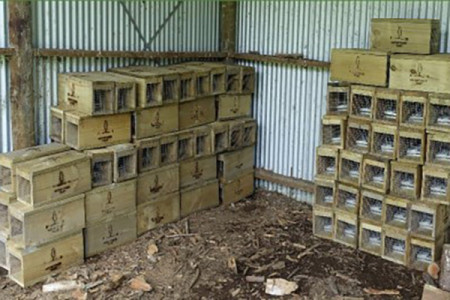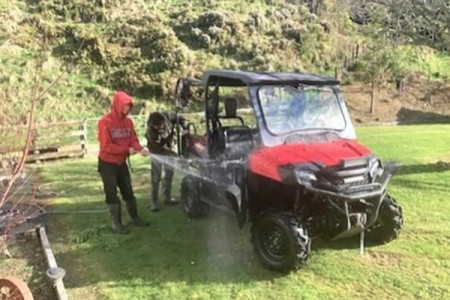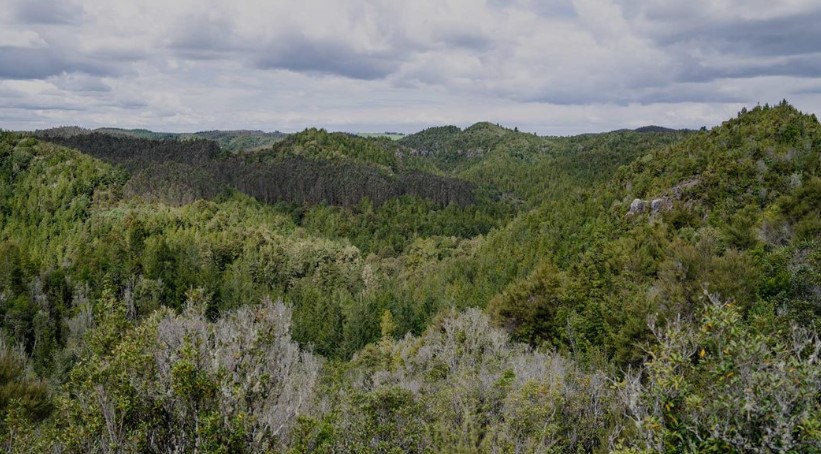"Through our programme [participants] learn practical skills by doing and these skills will remain with them throughout their lives"
– Murray Grant

Traps prior to being deployed. Photo: Kaitiakitanga Charitable Trust
A Waikato-based trust is making a difference in the lives of at-risk young people while also championing environmental initiatives.
Kaitiakitanga Charitable Trust (KCT)—established in 2018—works with small groups of young people to increase their self-esteem and social connections and introduce them to environmental knowledge and job prospects.
Members of the Trust work alongside youth teaching building skills to assemble predator trapping boxes as well as foundational skills in conservation and biodiversity.

Team members clean a vehicle following a day’s trapping. Photo: Kaitiakitanga Charitable Trust
These skills are then utilised in the environmental work undertaken by the Trust in the region, including predator control, species monitoring, pest weed control and native planting.
KCT received a two-year Waikato Regional Council Environmental Initiatives Fund (EIF) grant of $37,429 covering the 2023-24 and 2024-25 financial years. The EIF provides grants to projects which directly enhance and/or benefit the environment or provide environmental education.
The Trust is utilising its EIF funding contribution to purchase trapping materials for the construction of predator traps and to support the implementation and servicing of traps on farms adjacent to the northern end of Pureora Forest to help provide a buffer of protection for vulnerable native species that call Pureora home.
The Trust has also received previous council funding through the Small Scale Community Initiatives Fund which supports volunteer community groups and individual landowners undertaking ecological restoration through pest animal and plant control.
The Trust has three trainers who work with about 40 youth per year. Participants not only learn how to use basic tools and build the traps, but also about the environment, health and safety and tree identification, along with the importance of a work ethic and building personal relationships.
“It may take a week to build a trap, although it’s much faster once students have learned the necessary skills and have some practice under their belts,” says Kaitiakitanga Charitable Trust Founder Murray Grant.
“For many youth this might be the first time they have used tools or had to measure something,”
“Through our programme they learn practical skills by doing and these skills will remain with them throughout their lives.
“Just as importantly, the youth learn vital social skills, self-esteem and the value of work.”
Youth hear about the programme partly by word of mouth, such as friends, family and other connections, while others are referred via government agencies or the justice system.
“There is a network of people in the community who know what we are doing and believe it is a useful way to help young people and the environment,” says Murray.
Operations supervisor Layton Gardner has been working full-time at the programme for more than two years. Prior to that, he volunteered for eight years, helping with activities like tree planting and pest plant control.
Layton says the Trust’s workshop is a non-judgemental space that provides a positive outlet for the youthful energy of participants.
“You see a lot of change in them while they are here,” says Layton.
“By the end of the training they become more confident and more familiar with the use of tools. Some are also quite creative and make extra things like chairs for the team to sit on.”
“It’s rewarding work and makes you feel good to have helped out in the world,” says Layton.
Percy has been a supervisor on the programme for over a year, teaching trap-building along with topics such as pest control and the value of native trees.
“I love it here,” says Percy.
“I like to help and inspire the youth that come here.”
The traps the young people build are used in Northern Pureora, between Ōtorohanga and Tokoroa, where hundreds of traps are spread over around 5,500ha of farm land.
Murray says the trapping contributes to a healthier biodiversity, with bird life able to flourish with a reduction of introduced predators.
“The Trust is contributing to positive biodiversity outcomes through their work but are also generating significant positive social outcomes by providing youth with knowledge, opportunities and fostering a passion to connect with their heritage and their environment,” says EIF Fund Manager, Kate Pepper.



